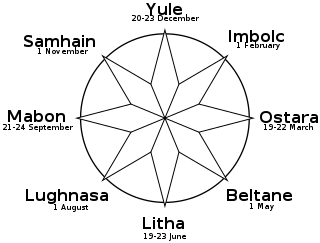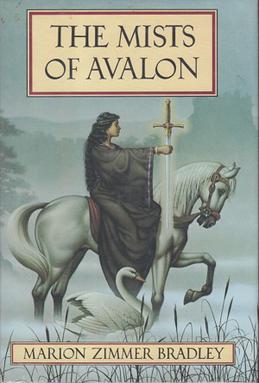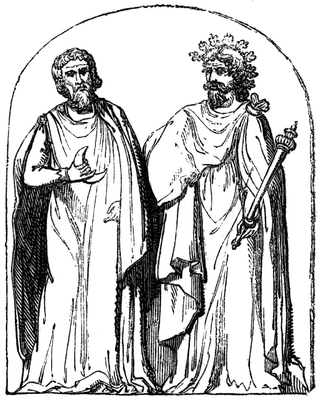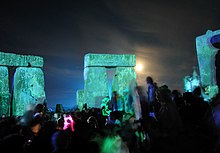
The Wheel of the Year is an annual cycle of seasonal festivals, observed by a range of modern pagans, marking the year's chief solar events and the midpoints between them. British neopagans crafted the Wheel of the Year in the mid-20th century, combining the four solar events marked by many European peoples, with the four seasonal festivals celebrated by Insular Celtic peoples. Different paths of modern Paganism may vary regarding the precise timing of each celebration, based on such distinctions as the lunar phase and geographic hemisphere.

Uther Pendragon (Brittonic), also known as King Uther, was a legendary King of the Britons and father of King Arthur.

The Mists of Avalon is a 1983 historical fantasy novel by American writer Marion Zimmer Bradley, in which the author relates the Arthurian legends from the perspective of the female characters. The book follows the trajectory of Morgaine, a priestess fighting to save her Celtic religion in a country where Christianity threatens to destroy the pagan way of life. The epic is focused on the lives of Morgaine, Gwenhwyfar (Guinevere), Viviane, Morgause, Igraine and other women of the Arthurian legend.
Ronald Edmund Hutton is an English historian who specialises in early modern Britain, British folklore, pre-Christian religion and Contemporary Paganism. He is a professor at the University of Bristol, has written 14 books and has appeared on British television and radio. He held a fellowship at Magdalen College, Oxford, and is a Commissioner of English Heritage.

The Stonehenge Free Festival was a British free festival from 1974 to 1984 held at the prehistoric monument Stonehenge in England during the month of June, and culminating with the summer solstice on or near 21 June. It emerged as the major free festival in the calendar after the violent suppression of the Windsor Free Festival in August 1974, with Wally Hope providing the impetus for its founding, and was itself violently suppressed in 1985 in the Battle of the Beanfield, with no free festival held at Stonehenge since although people have been allowed to gather at the stones again for the solstice since 1999.

The Battle of the Beanfield took place over several hours on 1 June 1985, when Wiltshire Police prevented The Peace Convoy, a convoy of several hundred New Age travellers, from setting up the 1985 Stonehenge Free Festival in Wiltshire, England. The police were enforcing a High Court injunction obtained by the authorities prohibiting the 1985 festival from taking place. Around 1,300 police officers took part in the operation against approximately 600 travellers.

The Reformed Druids of North America (RDNA) is an American Neo-Druidic organization. It was formed in 1963 at Carleton College, Northfield, Minnesota as a humorous protest against the college's required attendance of religious services. This original congregation is called the Carleton Grove, sometimes the Mother Grove. There are over 40 groves and proto-groves of the RDNA throughout the United States and Canada.

Celtic neopaganism refers to any type of modern paganism or contemporary pagan movements based on the ancient Celtic religion. One approach is Celtic Reconstructionism (CR), which emphasizes historical accuracy in reviving Celtic traditions. CR practitioners rely on historical sources and archaeology for their rituals and beliefs, including offerings to spirits and deities. Language study and preservation are essential, and daily life often incorporates ritual elements. While distinct from eclectic pagan and neopagan witchcraft traditions, there is some overlap with Neo-druidism.

The Winter King: A Novel of Arthur is the first novel of the Warlord Chronicles trilogy by Bernard Cornwell, originally published in the UK in 1995 by Penguin Group. The book is based on characters and plot elements from Arthurian myth, but considerably changed and re-worked.
The Avalon Series is a series of fantasy novels written by Marion Zimmer Bradley and Diana L. Paxson. Paxson took over sole authorship after Bradley's death in 1999. The series focuses on the legendary island of Avalon and the various women who have shaped its history and that of Britain.

The Modern Pagan movement in the United Kingdom is primarily represented by Wicca and Neopagan witchcraft, Druidry, and Heathenry. 74,631 people in England, Scotland and Wales identified as either as Pagan or a member of a specific Modern Pagan group in the 2011 UK Census.
Philip Shallcrass, often known by his Druid name, Greywolf, is Chief of the British Druid Order. He is an English artist, writer, poet, musician and singer-songwriter who pioneered a "shamanic" Druidism.

Arthur Uther Pendragon is a British eco-campaigner, Neo-Druid leader, media personality, and self-declared reincarnation of King Arthur, a name by which he is also known. Pendragon was the "battle chieftain" of the Council of British Druid Orders.

Rollo Maughfling is the Archdruid of Stonehenge and Britain. He is a long-time campaigner for the restoration of traditional rights of access to druidic sites, and respect for ancient druidic rituals. He is also a founder member of the Council of British Druid Orders.

Druidry, sometimes termed Druidism, is a modern spiritual or religious movement that promotes the cultivation of honorable relationships with the physical landscapes, flora, fauna, and diverse peoples of the world, as well as with nature deities, and spirits of nature and place. Theological beliefs among modern Druids are diverse; however, all modern Druids venerate the divine essence of nature.

The Pagan Religions of the Ancient British Isles: Their Nature and Legacy is a book of religious history and archaeology written by the English historian Ronald Hutton, first published by Blackwell in 1991. It was the first published synthesis of the entirety of pre-Christian religion in the British Isles, dealing with the subject during the Palaeolithic, Neolithic, Bronze Age, Iron Age, Roman occupation and Anglo-Saxon period. It then proceeds to make a brief examination of their influence on folklore and contemporary Paganism.
Pagan studies is the multidisciplinary academic field devoted to the study of modern paganism, a broad assortment of modern religious movements, which are typically influenced by or claiming to be derived from the various pagan beliefs of premodern Europe. Pagan studies embrace a variety of different scholarly approaches to studying such religions, drawing from history, sociology, anthropology, archaeology, folkloristics, theology and other religious studies.

A druid was a member of the high-ranking priestly class in ancient Celtic cultures. Druids were religious leaders as well as legal authorities, adjudicators, lorekeepers, medical professionals and political advisors. Druids left no written accounts. While they were reported to have been literate, they are believed to have been prevented by doctrine from recording their knowledge in written form. Their beliefs and practices are attested in some detail by their contemporaries from other cultures, such as the Romans and the Greeks.

The British Druid Order (BDO) is an international druid order, founded in 1979 as a religious and educational organisation. Its constitution defines it as a not-for-profit unincorporated association. It is commonly regarded as being one of the first, if not the first, explicitly neo-pagan Druid Orders. The order draws on medieval Welsh texts such as the Mabinogion and other early British/Celtic texts for inspiration and to re-connect with the pre-Christian, indigenous religious and spiritual practices of Britain which it believes to be shamanic in nature.















